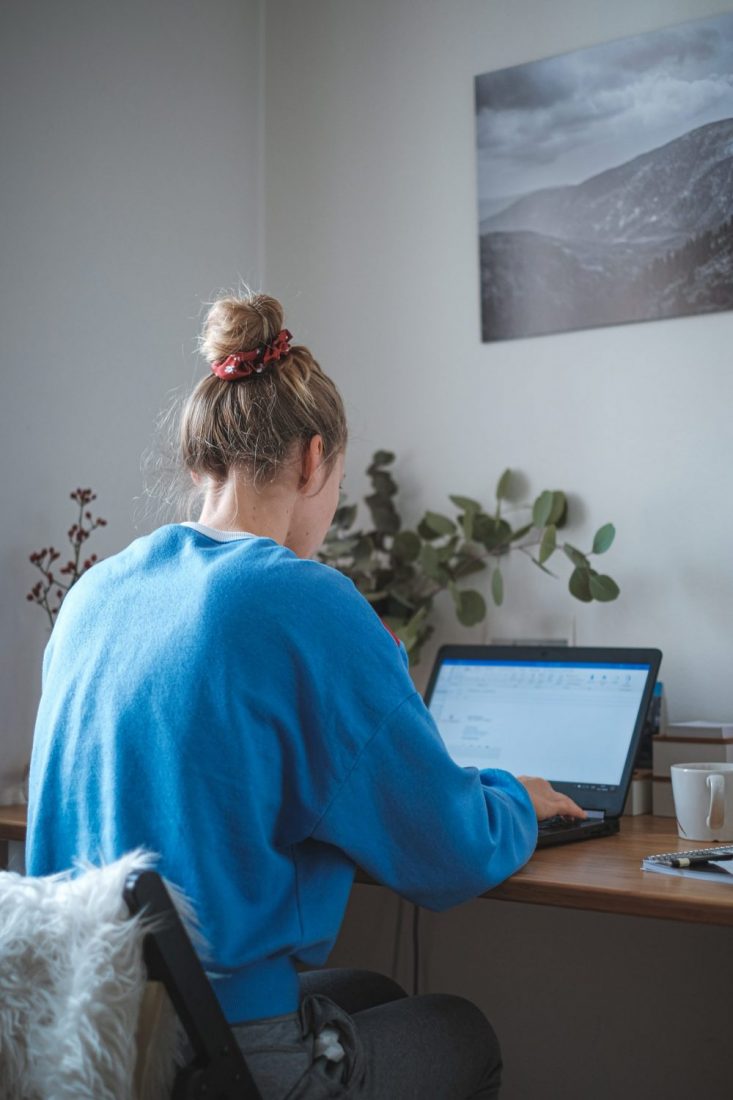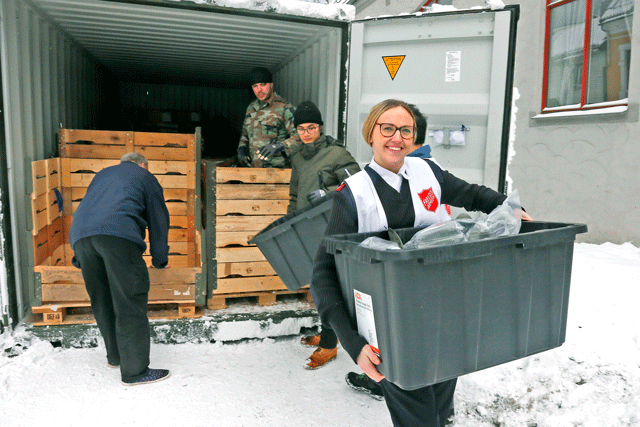Listen to this article
Listen to this article
Loading
Play
Pause
Options
0:00
-:--
1x
Playback Speed- 0.5
- 0.6
- 0.7
- 0.8
- 0.9
- 1
- 1.1
- 1.2
- 1.3
- 1.5
- 2
Audio Language
- English
- French
- German
- Italian
- Spanish
Open text
5 things to consider if you’re new to working from home. the covid-19 pandemic has upended life for literally billions of people across the world, confronting nearly every industry with a litany of decisions that might’ve seemed incomprehensible just three months ago. many employers have adopted work-from-home policies as stopgap measures so they can continue producing through the crisis. such arrangements pose terrific opportunities for many businesses to learn an entirely new way of getting things done while slashing operational costs and granting their employees unparalleled flexibility. but the effectiveness of each company’s work-from-home efforts will be determined by each individual worker’s daily regimen. working from home requires a thoughtful and considerate approach. if you think you’re going to adapt to it seamlessly without any extra effort, you could very well be caught off guard and scrambling to figure out just where you went wrong. there’s a lot of nuance to getting it right. but through my first two years of working remotely and providing services to four regular clients, i’ve corralled some insights on how to do it well. here are five things to consider if you’re new to working from home:. 1. designate an office space. even if you don’t have a spare bedroom to fashion into an hgtv-worthy home office, set aside a corner, an area, a square—that’s specifically for work. draw a hard line—whenever you enter this “zone,” all other responsibilities, like folding laundry, can wait. tackle your work items, and keep everything else out of the zone. make it comfortable. do you prefer to sit or stand for work? both? do you prefer to work with two screens? design it accordingly. these sorts of questions will no doubt require you to make more of an investment upfront. but trust me—they’ll save you money over the long haul and you’ll be happier and more productive to boot. 2. communicate with your team more than you think you need to. this is one you may not notice right away. but adjusting from frequent, sometimes mindless, water cooler chatter to essentially no face-to-face interaction can trigger a quiet sea of change in your workflow. you rely on those brief little exchanges more than you realize. even in conference phone calls. it’s not exactly the same as being in the room with everyone. it’s a different energy, absent facial cues and those subtle nods that provide a wider lens on the wire-to-wire meeting experience. video conferencing is the closest thing to the real deal, but again, it lacks the real-time dynamic that only exists when everyone can acknowledge everyone else’s feedback simultaneously. even slight delays in audio delivery can disrupt the flow of a conversation. so if anything, make sure you over-communicate, be it through slack or email or microsoft teams, to offset that dropoff in regular conversation. don’t assume your input is understood by all members of your team. leave no doubt. and when you finish a project, say so. over-communicate doesn’t mean be wordy. be concise, but talk consistently. by the same token, make sure you leave time to socialize. it doesn’t have to be all business, all the time, nor should it be. we can’t take lightly the potential impact of social distancing, pandemic or not, and having a frivolous exchange about your favorite penguin video can go a long way toward keeping you feeling sane. 3. put real clothes on, every day. “what?!” i know. you’re probably thinking, “well, there has to be some benefit to working from home, right?” but as much as you might be tempted to work from home all day in your bathrobe or pajamas since nobody can see you anyway (assuming you’re not video conferencing), you won’t do yourself any favors. because the truth is: if you feel productive, you’re far more likely to be productive. and whether we take five extra minutes in the morning to put on a real shirt and pants and look presentable—doesn’t have to be the most dapper ensemble in your closet—can dictate the tone for the entire day. if you consider getting ready in the morning your first task, guess what? you’ve already accomplished something before your work day’s even begun. also, if you do have an impromptu video conference call, your team won’t laugh at you. 4. take regular breaks, outside. yes, being cooped up inside all day working, not to mention taking care of kiddos on recess, is not conducive to productive workdays. so don’t assume because you’re already at home, you don’t need to take breaks. if anything, you need them now more than ever. step outside periodically. schedule them in your phone if you have to. take a few deep breaths, go for a walk (while complying with social distancing recommendations, of course) and return to your work when you feel refreshed and energized. 5. stay positive. this maelstrom of a march might have you feeling a little down. but if you’re working—remember that not everyone is able to work right now. any work is a blessing, so be sure to leave time to practice gratitude. positivity is, if you’ll excuse the term, contagious. so when you see an opportunity to help someone out, do so. and when you see a friend or coworker in need of a lift, encourage them. this pandemic is temporary. but the work habits you establish over the next few weeks and months don’t have to be. consider it an opportunity rather than an inconvenience, and it’ll change how you approach work each day. do good:. find these do gooders podcast episodes and more at caringmagazine.org/podcast. visitwesternusa.salvationarmy.orgto find the salvation army nearest you. give to supportthe fight for good in your community. did you know the salvation army served more than 23 million americans last year fighting hunger, homelessness, substance abuse and more—all in a fight for good? where can you help? take our free quiz to findwhat’s your causeand how you can join in today.
Open context player
Close context player
Plays:-Audio plays count
5 things to consider if you’re new to working from home. the covid-19 pandemic has upended life for literally billions of people across the world, confronting nearly every industry with a litany of decisions that might’ve seemed incomprehensible just three months ago. many employers have adopted work-from-home policies as stopgap measures so they can continue producing through the crisis. such arrangements pose terrific opportunities for many businesses to learn an entirely new way of getting things done while slashing operational costs and granting their employees unparalleled flexibility. but the effectiveness of each company’s work-from-home efforts will be determined by each individual worker’s daily regimen. working from home requires a thoughtful and considerate approach. if you think you’re going to adapt to it seamlessly without any extra effort, you could very well be caught off guard and scrambling to figure out just where you went wrong. there’s a lot of nuance to getting it right. but through my first two years of working remotely and providing services to four regular clients, i’ve corralled some insights on how to do it well. here are five things to consider if you’re new to working from home:. 1. designate an office space. even if you don’t have a spare bedroom to fashion into an hgtv-worthy home office, set aside a corner, an area, a square—that’s specifically for work. draw a hard line—whenever you enter this “zone,” all other responsibilities, like folding laundry, can wait. tackle your work items, and keep everything else out of the zone. make it comfortable. do you prefer to sit or stand for work? both? do you prefer to work with two screens? design it accordingly. these sorts of questions will no doubt require you to make more of an investment upfront. but trust me—they’ll save you money over the long haul and you’ll be happier and more productive to boot. 2. communicate with your team more than you think you need to. this is one you may not notice right away. but adjusting from frequent, sometimes mindless, water cooler chatter to essentially no face-to-face interaction can trigger a quiet sea of change in your workflow. you rely on those brief little exchanges more than you realize. even in conference phone calls. it’s not exactly the same as being in the room with everyone. it’s a different energy, absent facial cues and those subtle nods that provide a wider lens on the wire-to-wire meeting experience. video conferencing is the closest thing to the real deal, but again, it lacks the real-time dynamic that only exists when everyone can acknowledge everyone else’s feedback simultaneously. even slight delays in audio delivery can disrupt the flow of a conversation. so if anything, make sure you over-communicate, be it through slack or email or microsoft teams, to offset that dropoff in regular conversation. don’t assume your input is understood by all members of your team. leave no doubt. and when you finish a project, say so. over-communicate doesn’t mean be wordy. be concise, but talk consistently. by the same token, make sure you leave time to socialize. it doesn’t have to be all business, all the time, nor should it be. we can’t take lightly the potential impact of social distancing, pandemic or not, and having a frivolous exchange about your favorite penguin video can go a long way toward keeping you feeling sane. 3. put real clothes on, every day. “what?!” i know. you’re probably thinking, “well, there has to be some benefit to working from home, right?” but as much as you might be tempted to work from home all day in your bathrobe or pajamas since nobody can see you anyway (assuming you’re not video conferencing), you won’t do yourself any favors. because the truth is: if you feel productive, you’re far more likely to be productive. and whether we take five extra minutes in the morning to put on a real shirt and pants and look presentable—doesn’t have to be the most dapper ensemble in your closet—can dictate the tone for the entire day. if you consider getting ready in the morning your first task, guess what? you’ve already accomplished something before your work day’s even begun. also, if you do have an impromptu video conference call, your team won’t laugh at you. 4. take regular breaks, outside. yes, being cooped up inside all day working, not to mention taking care of kiddos on recess, is not conducive to productive workdays. so don’t assume because you’re already at home, you don’t need to take breaks. if anything, you need them now more than ever. step outside periodically. schedule them in your phone if you have to. take a few deep breaths, go for a walk (while complying with social distancing recommendations, of course) and return to your work when you feel refreshed and energized. 5. stay positive. this maelstrom of a march might have you feeling a little down. but if you’re working—remember that not everyone is able to work right now. any work is a blessing, so be sure to leave time to practice gratitude. positivity is, if you’ll excuse the term, contagious. so when you see an opportunity to help someone out, do so. and when you see a friend or coworker in need of a lift, encourage them. this pandemic is temporary. but the work habits you establish over the next few weeks and months don’t have to be. consider it an opportunity rather than an inconvenience, and it’ll change how you approach work each day. do good:. find these do gooders podcast episodes and more at caringmagazine.org/podcast. visitwesternusa.salvationarmy.orgto find the salvation army nearest you. give to supportthe fight for good in your community. did you know the salvation army served more than 23 million americans last year fighting hunger, homelessness, substance abuse and more—all in a fight for good? where can you help? take our free quiz to findwhat’s your causeand how you can join in today.
Listen to this article

















I’ve been working remotely for about 1 year now and I do all of the above things. I make sure I get up at the same time every morning and get dressed as though I am going into the office. The one thing I do now working remotely 5 day a week (instead of just 2) is to take a daily break. I never took breaks in the office, I would always say one more email, answer that call ( avoid the VM if you answer the call now).
I can see my neighbors out walking so it inspires me to get away from my desk and telephone and take a short walk.
Be safe, stay Positive, stay active.